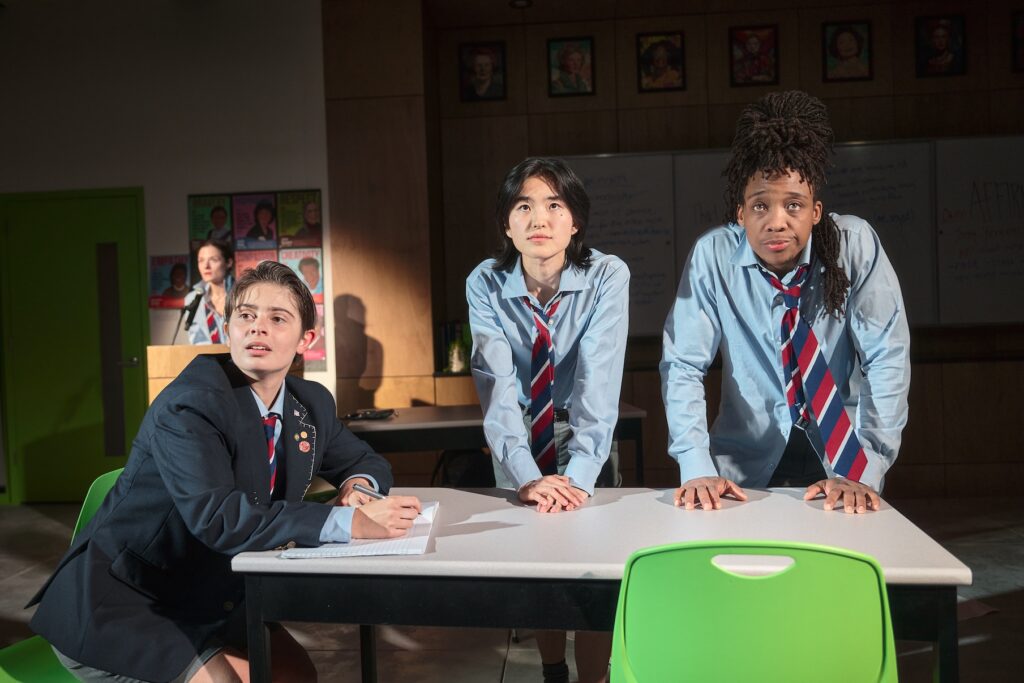No Broadway director is hotter right now than Danya Taymor, who won a Tony Award last year for her work on the musical “The Outsiders” and was nominated again this past season for “John Proctor is the Villain.” The latter, a play, followed a group of teenage girls as, emboldened by the #MeToo movement, they confronted toxic masculinity in life and literature.
Ms. Taymor’s latest project, “Trophy Boys,” finds her on similar terrain, but approaching it this time from a male perspective — or, rather, from what its Australian playwright, Emmanuelle Mattana, portrays as a male perspective. Not surprisingly, it isn’t pretty.
Ms. Mattana, who uses the pronouns “she” and “they,” is also one of four actors, all female or non-binary (“non-cis male bodies” is how they’re identified in the author’s program note), who portray very young men in Ms. Taymor’s off-Broadway production, which marks the play’s American premiere. Their characters are members of the debate team at an elite prep school; we meet them as they’re preparing to compete against a sister school, on the gals’ home turf.
The set, designed by Matt Saunders, breezily mocks the progressive and aspirational influences that now inform both private and public education, with illustrations of Ruth Bader Ginsburg, Oprah Winfrey, Gloria Steinem, and other feminist icons hanging over a whiteboard. (Margaret Thatcher is also represented, presumably to lend a jot of ideological balance.)
It’s in this classroom, with these portraits staring down at them, that the four guys learn the topic of their debate, that “feminism has failed women,” and the position they’ve been assigned: affirmative. There is immediate panic; one team member insists that he can’t “ethically” make that argument, while another simply says, “Can’t argue something I don’t believe.”

It soon becomes clear, however, that their real concerns are less rooted in ethics or belief and more pragmatic, and opportunistic. As another competitor notes, arguing against one’s personal convictions is “literally what debating is”; the ability to do so can also prove useful in, say, politics or business, to cite two fields that happen to interest these fellows.
Despite their protestations otherwise, in fact, the boys in “Boys” ultimately believe themselves to be the real victims of contemporary gender politics. This predictable irony is thrown into stark relief by a plot twist that arrives nearly halfway through Ms. Mattana’s sharply written, unapologetically dogmatic satire, in which each character emerges as a vehicle for condemning male chauvinism and oppression.
There’s Scott, whose swagger and status as the son of a noted lawyer are betrayed by a certain awkwardness that’s made almost touching by Esco Jouléy. David, the team advisor, seems to be the least aggressive at first, but as tensions build, he exposes a self-defensive menace that’s adroitly managed by Terry Hu.
Louisa Jacobson, Meryl Streep’s youngest daughter, turns in the funniest performance as Jared, a loose-limbed looker who repeatedly professes his love for women, particularly his mom and his girlfriend, who’s a member of the competing team. Like the other players, Ms. Jacobson has obvious and infectious fun aping the hyper-energetic, sometimes gawky physical language of male teenagers. (Tilly Evans-Krueger is credited with guiding their movement.)
Ms. Mattana plays Owen, the team’s brightest star and its biggest nerd; her stage directions describe him as “a dork who doesn’t realize he’s a dork—earnest, but self-important and a little bit too passionate about everything he does.” Owen is also, notwithstanding his dorkiness, a master manipulator, and Ms. Mattana captures all these qualities in a portrait that grows increasingly charismatic and disturbing.
Under Ms. Taymor’s crisp, witty guidance, all four cast members in “Trophy Boys” convey a convincing, compelling mix of camaraderie and competition. But however charmed or amused you may be by their characters at points, you’re bound, by design, to like them a lot less — or at least feel sorry for or scared of them — by the time this one-act play reaches its conclusion.
(Except for the headline, this story has not been edited by PostX News and is published from a syndicated feed.)

